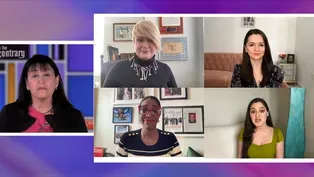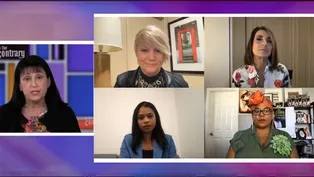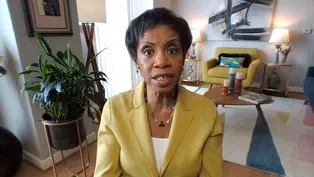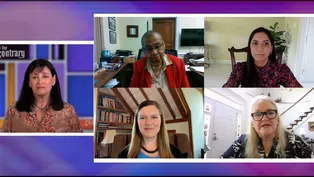
TTC Extra: New White House Initiative on Women's Health
Clip: Season 32 | 6m 38sVideo has Closed Captions
First Lady Jill Biden spearheads a White House initiative for Women's Health
First Lady Jill Biden spearheads a White House initiative for Women's Health, addressing gender disparities in diagnosis and treatment. Recent findings highlight a 5.8-year life expectancy gap between women and men in the U.S., with factors like COVID-19 and violence playing a role. Researchers stress the need for improved healthcare access.
Problems with Closed Captions? Closed Captioning Feedback
Problems with Closed Captions? Closed Captioning Feedback
Funding for TO THE CONTRARY is provided by the E. Rhodes and Leona B. Carpenter Foundation, the Park Foundation and the Charles A. Frueauff Foundation.

TTC Extra: New White House Initiative on Women's Health
Clip: Season 32 | 6m 38sVideo has Closed Captions
First Lady Jill Biden spearheads a White House initiative for Women's Health, addressing gender disparities in diagnosis and treatment. Recent findings highlight a 5.8-year life expectancy gap between women and men in the U.S., with factors like COVID-19 and violence playing a role. Researchers stress the need for improved healthcare access.
Problems with Closed Captions? Closed Captioning Feedback
How to Watch To The Contrary
To The Contrary is available to stream on pbs.org and the free PBS App, available on iPhone, Apple TV, Android TV, Android smartphones, Amazon Fire TV, Amazon Fire Tablet, Roku, Samsung Smart TV, and Vizio.
Providing Support for PBS.org
Learn Moreabout PBS online sponsorshipHello, I'm Bonnie Erbé, welcome to TTC Extra.
Women's Health research will get a boost with a new White House initiative to be led by First Lady Jill Biden.
Working with federal agencies, White House Gender Policy Council researchers will present recommendations to close the gap in women's diagnosis, treatment and prevention plans.
This comes as a new study finds women are living 5.8 years longer than men in the United States.
COVID 19 drug overdoses, suicides and gun violence are significant contributors to deaths among women.
Researchers suggest increased access to health care is key to expanding life expectancy.
So, Rina, what do you think is the most important factor in expanding women's life expectancy?
I've studied public health at the graduate level over a decade and a half ago, and I think some things that have not changed is my sense that women are not really properly taken into account when it comes to clinical research studies and that is a really big problem when we're looking at the efficacy of drugs.
You know, have we taken into account women of all sizes, for example, women of all age ranges?
And there are a number of conditions for which we just know the data is not there because we have not done the data for those women.
So here we sort of sit in a man's world, and I don't think this is a bad move for the White House to take on.
And I think the first lady is concerned about this as an educator.
But I also feel very strongly about the fact that women's health has just really not been prioritized.
As a young mother, I can tell you And particularly women of the health of women of color.
Yeah.
And there's a tremendous amount of talk about, you know, pain and, you know, related to black women in particular around maternal health care.
And that's just a conversation that needs to continue.
You know, as a as a woman of South Asian descent of ancestry, like, you know, I just I feel and in many ways that some sometimes I'm not seen in certain parts of health care.
And look, that's a broad statement.
But what I don't have time to really deeply get into.
But what I mean to really say here is that there's a lot that needs to be done to support the American family unit, but it starts with the mother.
Donna, your thoughts?
When I saw this health initiative started, I thought about the very first women's health initiative that was actually launched by Dr. Bernadine Healy, who sadly is no longer with us.
She was a Republican appointee of the first President Bush, and she really advocated like crazy for women's health at the National Institutes for Health.
What's different is, you know, about this initiative.
Well, I mean, actually, this is this really builds on that.
I mean, there was in the nineties, of course, the office on Women's Health really was stood up and functioned at the National Institutes of Health.
And that resulted in significant changes in the in the approach to clinical research and inclusion of of women in research trials.
And that was really important.
And I think that this new initiative really builds on that.
I mean, Knight, for example, has stood up and I'm so glad they finally have an office on autoimmune disease.
And the reason is because 80% of women are represented in the population affected by autoimmune.
And so I think that this really builds on on that.
And like Rina, I would love to make sure that I'm included that my, you know, face and voice and circumstances included in in research on women's health.
We've talked a lot about maternal mortality and black infant mortality.
And I think that these are all issues that where women could really benefit from that.
Even the Department of Defense, it's you know, kind of making sure that the research that the Department of Defense does, which is really substantial, also includes the different phases, voices and circumstances of women.
And so this really builds on the initiative of the early 1990s and I hope will grow and expand from there.
Well, as an allopathic physician, but one who dealt with eyes exclusively, but having been through medical training, I am very much aware that yes, human biology does have some profound truths that can't be escaped.
And one of them is that women or females x X chromosomes are of function quite distinctly biologically versus men with x Y chromosome endowment.
And I applaud an effort, any effort to recognize that there are such distinctions and that they are relevant to health care in so many aspects.
And of course there are all the yes, the social determinants of health.
And that of course is a quite distinct category.
But human biology alone demands that we take these distinctions into account.
So I think Rina mentioned was that there is fortunately an ever expanding marketplace in the market.
The market can offer more agile solutions to problems that have plagued us for all of human existence.
Typically then government can.
Yeah, well, we can't improve what we don't measure.
And so I'm really excited about the new initiative that Dr. Jill Biden is going to be leading, because now every federal agency that has anything to do with health has a deadline in which they have to say what their currently doing on women's health.
So, I mean, you can't you can't improve something that you don't measure and look at, as we know and as all of the panelists have said, for far too long, women's bodies have not been the default in research.
And there are women's health is under explored and under supported.
So I think this is a fantastic step and I'm grateful that the White House is taking it.
Thanks to you all for a wonderful program.
That's it for this edition of TTC Extra.
Whether you agree or think To the Contrary, see you next time.
TTC Extra: Lauren Boebert Cleared of Allegation
Lauren Boebert was cleared of an accusation put forth by her ex husband (7m 24s)
TTC Extra: New White House Initiative on Women's Health
Video has Closed Captions
First Lady Jill Biden spearheads a White House initiative for Women's Health (6m 38s)
TTC Extra: Rise in Infant Mortality
Video has Closed Captions
U.S. infant mortality up 3% in 2022, first rise in 20+ years. (5m 25s)
TTC Extra: Women in Scripted vs. Unscripted TV
A new report shows that women are more likely to be in unscripted shows (6m 33s)
TTC Extra: Mexico's Women Presidential Candidates
Video has Closed Captions
Mexico is on the brink of electing its first female president. (4m 54s)
Advice often given to women about adopting a more assertive communication style is being (3m 16s)
Providing Support for PBS.org
Learn Moreabout PBS online sponsorshipFunding for TO THE CONTRARY is provided by the E. Rhodes and Leona B. Carpenter Foundation, the Park Foundation and the Charles A. Frueauff Foundation.




























